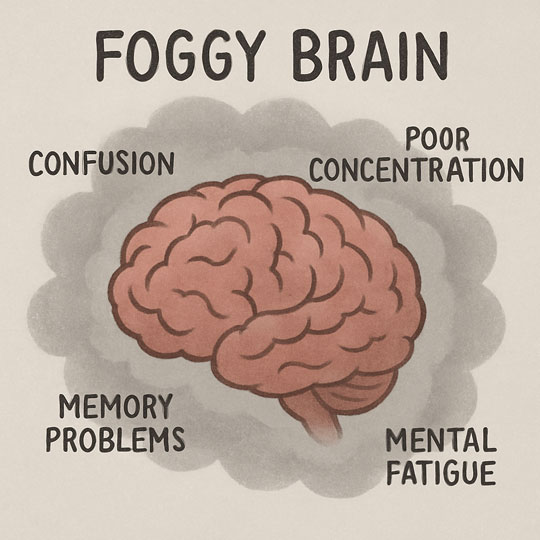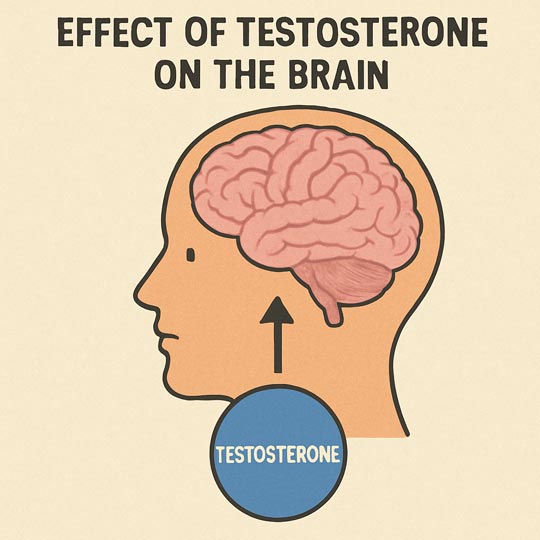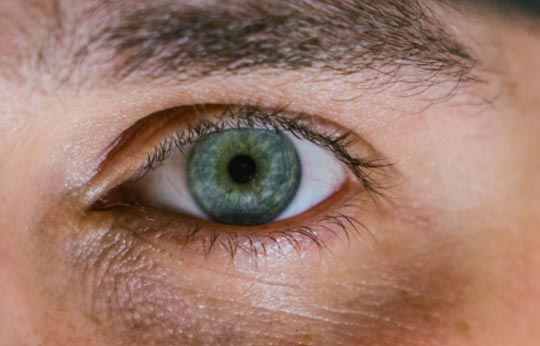
Brain fog can be a frustrating experience. It often leaves individuals feeling confused and unfocused. Many people struggle with forgetfulness and mental fatigue.
Testosterone Replacement Therapy (TRT) is gaining attention as a potential solution. It aims to restore testosterone levels in those with deficiencies. This therapy might offer relief from brain fog symptoms.
Low testosterone levels can impact cognitive function. They may contribute to mental clarity issues. TRT could help improve these cognitive challenges.
The benefits of TRT extend beyond mental clarity. It may also enhance mood and energy levels. These improvements can lead to better overall cognitive function.
Eye health is another area where TRT might be beneficial. Hormonal changes can affect vision and eye health. TRT could potentially improve visual acuity.
Understanding the root causes of brain fog is crucial. Hormonal imbalances, stress, and diet all play a role. Addressing these factors is key to effective treatment.
TRT is not a one-size-fits-all solution. It requires careful consideration and medical guidance. Consulting with a healthcare provider is essential before starting TRT.
Understanding Brain Fog: Symptoms and Causes
Brain fog is more than just a fleeting feeling of confusion. It’s a condition marked by persistent cognitive issues. Individuals often report difficulties with memory and concentration.
Several factors can trigger brain fog. Stress, for example, can significantly affect mental clarity. Other potential causes include poor diet and lack of sleep.
Hormonal imbalances also play a significant role. Declining testosterone levels, especially in aging individuals, might contribute to cognitive disturbances. Recognizing these triggers can aid in finding effective treatments.
Identifying brain fog involves observing specific symptoms:
- Memory lapses
- Lack of concentration
- Mental fatigue
- Confusion and forgetfulness

Lifestyle choices can exacerbate brain fog. Diets low in essential nutrients often worsen cognitive symptoms. Similarly, insufficient exercise can contribute to mental sluggishness. Addressing brain fog requires a holistic approach. A balanced diet and stress management techniques can be beneficial. It’s essential to tailor solutions based on individual needs and symptoms.
Understanding the root causes is critical. This knowledge leads to better-targeted treatment approaches. Comprehensive solutions often provide the best chance of relief.
The Role of Testosterone in Cognitive Function
Testosterone is well-known for its role in muscle growth. However, it also significantly influences brain health. Its impact extends to cognitive function and mental clarity.
As testosterone levels decline with age, cognitive issues may arise. This hormonal drop can lead to a decrease in memory and focus. Balanced testosterone is crucial for maintaining sharp mental abilities.
Research suggests testosterone affects brain regions responsible for cognitive skills. These areas include those associated with memory and attention. Thus, maintaining healthy testosterone levels might aid cognitive function.
Effects of testosterone on cognitive health include:
- Memory retention enhancement
- Improved concentration
- Sharper mental processing

The hormone also plays a role in regulating mood. Mood swings and depression may emerge with low testosterone levels. A stable mood is essential for clear thinking.
By understanding testosterone’s role in cognitive function, we can see its broader health implications. This knowledge underscores the potential benefits of therapies like TRT. Improving testosterone levels may provide significant cognitive advantages.
What Is TRT? An Overview of Testosterone Replacement Therapy
Testosterone Replacement Therapy (TRT) is a medical treatment. It aims to restore testosterone levels in individuals with low hormone levels. This approach is particularly beneficial for men experiencing testosterone deficiency.
The therapy helps alleviate symptoms linked to low testosterone. These symptoms often include fatigue, reduced libido, and mood disturbances. TRT not only addresses physical concerns but may also enhance mental wellness.
It’s important to tailor TRT to individual needs. Consulting with a healthcare provider ensures the most appropriate form and dosage. A personalized approach maximizes the benefits and minimizes risks.
How Low Testosterone Contributes to Brain Fog
Low testosterone levels can significantly impact brain health. Cognitive functions and mental clarity are often compromised when hormone levels drop. This can result in a frustrating experience for many.
Hormonal imbalances play a critical role in brain fog. They can interfere with neurotransmitter function, affecting concentration and memory. This disruption may manifest as cognitive dullness.
The link between low testosterone and brain fog is complex. Testosterone not only affects physical health but also mental wellness. It acts on receptors in the brain that are vital for neurological function.
Symptoms of testosterone-related brain fog may include:
- Difficulty concentrating
- Forgetfulness
- Mental fatigue
Addressing low testosterone can alleviate these symptoms. By restoring hormone balance, TRT may help improve focus and cognitive abilities. Understanding the relationship between testosterone and brain health is essential for effective treatment.
TRT for Brain Fog: What the Science Says
Research on TRT's effectiveness for brain fog is still developing. Some studies suggest positive outcomes, while others call for more data. Here's what is currently known.
Testosterone Replacement Therapy may improve mood and energy levels. Enhanced mood can contribute to better mental clarity. This may reduce symptoms of brain fog.
A few studies highlight TRT's role in enhancing memory. Improved memory functions can lead to sharper cognitive abilities. This can be particularly beneficial for those with memory-related brain fog.
Additionally, testosterone might support neuroplasticity. This is the brain's ability to form new connections. Improved neuroplasticity can enhance problem-solving and creativity.
Other areas of cognitive function might also see benefits. Researchers suggest TRT could improve attention and focus. These improvements can alleviate the scatterbrained feeling common in brain fog.
Studies also point out that testosterone affects neurotransmitter levels. This can positively influence synaptic activity. Healthy synapses may lead to smoother thought processes.
Despite these promising findings, more research is required. Individual responses to TRT can vary widely. Personal healthcare needs should guide treatment plans.

Mental Clarity and Cognitive Benefits of TRT
Testosterone Replacement Therapy is linked to improved mental clarity. This isn't just about thinking faster. It's about enhancing overall cognitive function.
Mental clarity refers to sharp and focused thinking. TRT can help clear away the fog that dulls your mind. This results in sharper concentration and improved decision-making.
TRT may aid in enhancing memory retention and recall. These benefits extend beyond just remembering facts. It also involves improved episodic memory, which handles personal experiences.
Besides memory, TRT might improve attention span. A better attention span means you can stay focused longer. This is crucial for tasks requiring sustained concentration.
Another cognitive benefit lies in executive functions. This includes problem-solving and planning skills. TRT could potentially enhance these higher-level brain functions.
The benefits may differ among individuals. Factors such as age, health, and lifestyle play a role.
It's important to consult healthcare experts for personalized advice.
- Improved concentration
- Enhanced memory retention
- Better attention span
- Stronger problem-solving skills
- Balanced mood
Though promising, TRT isn't a one-size-fits-all solution. Careful evaluation can ensure it fits your health goals. Always consider medical guidance before starting TRT.
TRT and Eye Health: Is There a Connection?
Testosterone Replacement Therapy might influence eye health. Hormones, including testosterone, play a role in maintaining eye functions. Understanding this connection is key for overall wellness.
Testosterone affects blood circulation in the eyes. Healthy blood flow ensures that the eyes receive necessary nutrients. TRT could potentially support these processes, keeping your eyes healthy.

Certain research suggests a link between testosterone levels and visual acuity. Low testosterone might increase the risk of age-related eye issues. Hence, TRT can be a consideration for some in managing eye health.
Some eye problems might respond positively to hormonal balance. It's vital to note that TRT's impact on eyes varies. Personal health factors and conditions must be considered.
When exploring TRT, comprehensive health assessments are vital. This includes eye health checks. Always seek professional advice before starting any hormonal treatment.
- Supports blood flow
- Maintains visual acuity
- May reduce eye-related risks
- Requires personalized health assessment
The interplay between testosterone and eye health remains complex. Continued research is essential for fully understanding these connections.
Brain Fog Solutions: Lifestyle, Diet, and Complementary Approaches
Addressing brain fog involves more than just medical treatments. A holistic approach can be highly beneficial. Lifestyle changes play a crucial role in managing brain fog symptoms.
Regular exercise boosts blood circulation and improves brain function. Activities like walking, jogging, or cycling can enhance mental clarity. A consistent workout routine supports both physical and cognitive health.

Diet also influences brain health significantly. Consuming a balanced diet with omega-3-rich foods helps. Fish, nuts, and seeds are excellent choices for boosting brain power.
Stress management is another key component. Techniques such as meditation or yoga promote relaxation. Reducing stress levels can lead to clearer thinking and reduced brain fog.
Consider complementing these with cognitive exercises. Puzzles and memory games can sharpen mental faculties. Engaging in activities that challenge your brain helps keep it active.
- Engage in regular exercise
- Eat a nutrient-rich, balanced diet
- Practice stress management techniques
- Participate in cognitive exercises
Combining these lifestyle adjustments creates a solid foundation for brain fog solutions. Consulting with healthcare professionals can help tailor these strategies to individual needs.
Risks, Side Effects, and Considerations Before Starting TRT
Testosterone Replacement Therapy (TRT) isn't a one-size-fits-all solution. It comes with potential risks and side effects. Understanding these is crucial before starting treatment.
Common side effects include acne and oily skin. Some might experience mild fluid retention. More serious side effects, although rare, can include increased red blood cell count.
Before starting TRT, a thorough health evaluation is essential. Discuss your medical history with a healthcare provider. This helps in assessing whether TRT is suitable for you. Informed decisions lead to better outcomes. Weighing the pros and cons with professional guidance ensures a safe approach to managing brain fog with TRT.
Who Should Consider TRT for Brain Fog?
Testosterone Replacement Therapy may benefit specific groups. Men with clinically low testosterone and persistent brain fog should consider it. Comprehensive medical evaluations are crucial for these individuals.
Symptoms such as fatigue and concentration difficulties often accompany brain fog. If these symptoms persist despite lifestyle changes, TRT might be worth exploring. Consulting with a healthcare provider is imperative.
Potential candidates often share common traits. These include:
- Clinically low testosterone levels
- Persistent fatigue and cognitive issues
- Lack of response to non-hormonal treatments
Deciding to start TRT requires careful evaluation. It's essential to confirm that low testosterone is the cause of your symptoms. Always rely on medical advice before proceeding with TRT.
Monitoring Progress: What to Expect on TRT
Once you start TRT, monitoring your progress is vital. Keep track of changes in your symptoms and overall well-being. This helps in assessing the therapy's effectiveness over time.
Regular check-ups with your healthcare provider are essential. They ensure your testosterone levels are within the desired range. Adjustments to the therapy might be necessary based on these evaluations.
Be mindful of potential side effects and report them promptly. Common things to look for include:
- Changes in mood or energy levels
- Improvements in mental clarity
- Alterations in sleep patterns
By staying vigilant, you can optimize your TRT experience.
Frequently Asked Questions About TRT and Brain Fog
Many people wonder if TRT is effective for brain fog. Scientific studies suggest it may help improve mental clarity and reduce symptoms.
Is TRT safe for everyone experiencing brain fog? Not necessarily. Consult a healthcare provider to determine if it's right for you.
How soon can results be expected from TRT? Results vary but some people notice improvements within a few weeks.
Here are common questions about TRT:
- Can TRT help with memory problems?
- Are there natural ways to boost testosterone?
These questions highlight the need for personalized medical advice. A thorough evaluation will help determine the best approach.
Conclusion: Is TRT the Right Brain Fog Treatment for You?
Deciding to start TRT is a significant choice. It's not just about alleviating brain fog. It involves understanding potential benefits and risks. Every case is unique, and consultation with a healthcare provider is vital.
TRT may offer relief for those struggling with cognitive decline due to low testosterone. However, it is crucial to consider personal health history and conditions. Lifestyle changes and other treatments should also be evaluated alongside TRT.
In the end, choosing TRT should be a well-informed decision. Comprehensive assessments ensure treatment aligns with your health needs and goals. Always approach TRT as part of a holistic strategy for improved cognitive health and well-being.
